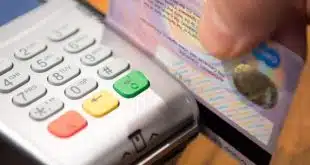Rejected by many retailers, the point-of-purchase electronic-check code has one fan that really counts: Wal-Mart Stores Inc., the world's largest retailer. Bentonville, Ark.-based Wal-Mart expects the last 300 of its approximately 3,400 U.S. Wal-Mart locations to go live with the automated clearing house payment option next Monday. Wal-Mart's push behind POP, which started as a pilot program at the chain five years ago, has involved bringing up 1,800 stores in the past six months and helped turn the lackluster POP into the fastest-growing automated clearing house e-check code in the past few quarters (Digital Transactions News, March 22). It is part of concerted move to reduce payment costs, Mike Cook, vice president and assistant treasurer, reported at a trade show Monday. He said credit and signature-based debit cards cost Wal-Mart about $1 billion a year to accept. Interchange is “a very, very high percentage of that figure,” Cook tells Digital Transactions News. “It's just a phenomenal number that has to be addressed,” Cook said Monday while speaking at a session of the Payments 2007 conference in Chicago sponsored by NACHA?The Electronic Payments Association, governing body of the ACH. Interchange is the amount of a Visa/MasterCard card sale assessed to the merchant acquirer and paid to the card issuer, with acquirers usually passing the full expense on to their merchant clients. Credit cards and signature-debit cards are declining slightly in Wal-Mart's payment mix, having represented about 19% of U.S. transactions in fiscal 2003 but about 17% fiscal 2007. Lower-cost PIN-debit cards, meanwhile, are rising: 15% of payments in 2003 versus 25% in 2007. PIN-debit now accounts for 30% of U.S. sales and 50% of sales in Canada. In the U.S., Wal-Mart's point-of-sale terminals prompt customers to enter the PIN when cards with combined PIN and signature functionality are swiped. Even though checks account for 16% of payments versus 27% four years ago, Wal-Mart still will take in nearly 1 billion checks this year, Cook reported. Hence, like many other retailers, Wal-Mart is looking to convert paper checks into electronic transactions not only for the cost savings versus cards, but to counter rising fraud in paper check transactions. POP was only ACH code for point-of-sale purchases until last month, when the new back-office conversion code went live March 16 (Digital Transactions News, March 16). Many retailers, however, shy away from POP because its rules require them to return voided checks to the customer and get an explicit OK for the transaction, and most feel every lane should be equipped with a scanner to capture magnetic ink character recognition (MICR) bank-routing and account data. Those perceived obstacles didn't deter Wal-Mart. “It's really a lot easier than you think,” said Cook. Upgrading POS equipment to accept POP involved no changes in hardware, which already had MICR readers, and a largely problem-free download of the required POS software from a central host. Customer-service managers in each store were required to call a toll-free Wal-Mart number for a half-hour conference call to learn how to train their clerks about POP. Wal-Mart is not imaging the checks. According to Cook, checkout times are neutral to even slightly faster than pre-POP, in part because customers no longer are filling out checks. Cook and another retailer at the session, Lary Sinewitz, executive vice president of Hollywood, Fla.-based consumer electronics seller BrandsMart USA, said implementing POP has helped reduce fraud because of faster settlement times. Also, Wal-Mart has a huge database of check transactions that helps it flag suspect transactions. Wal-Mart has no plans to implement BOC, a new ACH code that allows retailers to scan checks in their back offices. One reason is that Wal-Mart doesn't want to keep check images for the two years required by the NACHA rules, according to Cook. He also says BOC requires staff training for new software and its opt-out requirements. “BOC is a solution for a problem that doesn't exist,” he said. Some of Wal-Mart's cohorts have differing views. One processing executive who asked not to be identified tells Digital Transactions News that he knows of at least two major retailers that have committed to BOC and have put out requests for proposals to implement it.
Check Also
It’s CCCA Times Two As Congress Drops an Attachment Effort
Plans to attach an amended version of the Credit Card Competition Act to a cryptocurrency-infrastructure …




